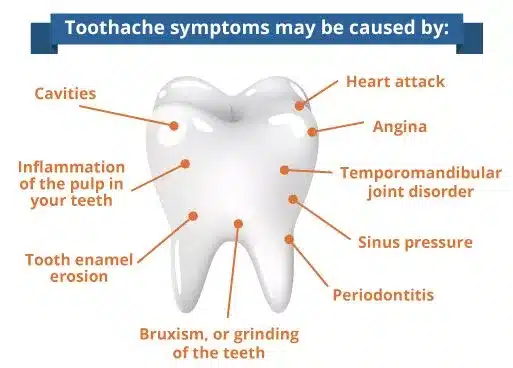Toothache is one of the most common dental problems that people experience. It can be caused by a variety of factors, such as tooth decay, gum disease, or dental trauma.

While it is always important to seek professional dental care to address the underlying cause of toothache, there are several home remedies that can provide temporary relief from the pain and discomfort associated with toothache.

In this blog post, we will explore some of the MOST effective home remedies for toothache that you can try at home.
- Saltwater Rinse
Saltwater rinse is a simple and effective home remedy for toothache. It works by reducing inflammation and killing bacteria in the mouth. To make a saltwater rinse, mix a teaspoon of salt in a glass of warm water and swish it around your mouth for a few minutes. Spit out the solution and repeat the process several times a day.
Untold Tooth Care Secrets: What Your Dentist Won't Tell You
Uncover little-known tooth care secrets that dentists often keep to themselves. Discover Insider Tips to Achieving Optimal Oral Health and a Beautiful Smile
- Clove Oil
Clove oil is a natural numbing agent that can help relieve toothache pain. It contains eugenol, which has both antibacterial and anti-inflammatory properties. To use clove oil, soak a cotton ball in the oil and apply it directly to the affected area. You can also mix a few drops of clove oil with a carrier oil, such as coconut oil, and apply it to the affected area.
- Ice Pack
An ice pack can help reduce inflammation and numb the pain associated with toothache. Place an ice pack or a cold compress on the outside of your cheek near the affected tooth for about 15 minutes at a time. Repeat the process several times a day.
- Garlic
Garlic has antibacterial properties that can help fight infection and reduce inflammation. To use garlic for toothache, crush a garlic clove and apply it directly to the affected area. You can also chew a garlic clove or add garlic to your food for additional benefits.
- Peppermint Tea Bags
Peppermint tea bags can help numb the pain and reduce inflammation associated with toothache. Steep a peppermint tea bag in hot water, let it cool down, and apply it directly to the affected area. You can also drink peppermint tea to enjoy its benefits.
- Hydrogen Peroxide Rinse
Hydrogen peroxide is a natural disinfectant that can help kill bacteria in the mouth and reduce inflammation. To use hydrogen peroxide for toothache, mix equal parts of hydrogen peroxide and water and swish it around your mouth for a few minutes. Spit out the solution and rinse your mouth with water.
While these home remedies can provide temporary relief from toothache, it is important to seek professional dental care if the pain persists or is accompanied by other symptoms, such as fever or swelling.
Preventing Toothache
Prevention is the best way to avoid toothache. Here are some tips to help you prevent toothache:
- Brush and floss regularly: Brush your teeth at least twice a day and floss once a day to remove plaque and bacteria from your teeth and gums.
- Use fluoride toothpaste: Fluoride toothpaste can help strengthen your teeth and prevent tooth decay.
- Limit sugary and acidic foods: Sugary and acidic foods can damage your teeth and increase your risk of tooth decay and gum disease.
- Wear a mouthguard: If you play sports or grind your teeth at night, wear a mouthguard to protect your teeth from injury.
- Visit your dentist regularly: Visit your dentist every six months for a checkup and cleaning to maintain good oral health.
Conclusion
Toothache is a common dental problem that can cause discomfort and pain. While home remedies such as saltwater rinse, clove oil, ice pack, garlic, peppermint tea bags, and hydrogen peroxide rinse can provide temporary relief, it is important to seek professional dental care to address the underlying cause of the toothache.
Dental problems such as tooth decay, gum disease, and dental trauma can cause toothache, and seeking timely treatment from a dental professional is essential to prevent further damage to your teeth and gums. In addition, untreated dental problems can lead to more serious complications, including tooth loss and systemic infections.
Prevention is key to avoiding toothache and maintaining good oral health. Practicing good oral hygiene, limiting sugary and acidic foods, wearing a mouthguard, and visiting your dentist regularly can all help prevent toothache and other dental problems.
Good oral hygiene involves brushing your teeth at least twice a day with fluoride toothpaste, flossing daily, and using mouthwash to remove bacteria and plaque from your mouth.
Limiting sugary and acidic foods can help reduce the risk of tooth decay and gum disease, while wearing a mouthguard can protect your teeth from damage during sports and nighttime teeth grinding.
Untold Tooth Care Secrets: What Your Dentist Won't Tell You
Uncover little-known tooth care secrets that dentists often keep to themselves. Discover Insider Tips to Achieving Optimal Oral Health and a Beautiful Smile
Visiting your dentist regularly is also important to maintain good oral health. Your dentist can identify and treat dental problems before they worsen, provide professional cleanings to remove tartar and plaque buildup, and offer advice on how to improve your oral hygiene practices.
In conclusion, while home remedies such as saltwater rinse, clove oil, ice pack, garlic, peppermint tea bags, and hydrogen peroxide rinse can provide temporary relief from toothache, seeking professional dental care is essential to address the underlying cause of the problem.
Prevention is key to maintaining good oral health, and practicing good oral hygiene, limiting sugary and acidic foods, wearing a mouthguard, and visiting your dentist regularly can all help prevent toothache and other dental problems.
